The enduring delights of Three Men In A Boat
Last week I wrote about a joke that maybe isn't funny any more. This week, by way of contrast, a book that most definitely is.
I was given this lovely thing on Saturday:
The book came into my hands just as an article I wrote about comedy aging badly was getting some gratifying attention. It reminded me that some humour can stand the test of time. And then some.
Just in case you don’t know, Three Men In A Boat is Jerome K Jerome’s classic late-Victorian story of three men (George, Harris and J - the book’s narrator) who (along with a dog called Montmorency) decide to take a boating holiday on the Thames. The narrator declares that this for the good of their health:
“We should have fresh air, exercise and quiet; the constant change of scene would occupy our minds (including what there was of Harris’s); and the hard work would give us a good appetite, and make us sleep well.”
I can’t resist quoting the next paragraph too:
“Harris said he didn’t think George ought to do anything that would have a tendency to make him sleepier than he always was, as it might be dangerous. He said he didn’t very well understand how George was going to sleep any more than he did now, seeing that there were only twenty-four hours in each day, summer and winter alike; but thought that if he did sleep any more, he might just as well be dead, and so save his board and lodging.”
The book continues in the same delightful vein, as the men battle with river locks, the English weather, camping arrangements, tins of pineapples and all the other challenges the holiday throws at them, up to and including making stew.
(I won’t say too much about the stew because I don’t want to deny you the opportunity of encountering this wonderful comic writing for the first time, on the page. Please trust me for now that it is very funny. Very, very funny.)
The other thing to know is that the most intelligent and charismatic character is Montmorency the dog — notwithstanding the fact that his “ambition in life is to get in the way and be sworn at.”
In brief, this book is joyful. I love it. So I was very happy to be given this elegant little copy. My (Much) Better Half picked it up at a book sale in the village hall of Holme-next-the-Sea. It cost 50p. Which seems like a bargain to me. It’s an abridged edition from 1927, intended for German readers in schools:
Here’s the introduction:
On this page, the learned Dr K Horst justifies presenting a “recent” novel like this one1 to school readers on the grounds that it gives a useful view of the “peculiarity” of a foreign people.
He writes:
"Jerome's book pleasantly introduces us to an important piece of English folk life: rowing and water sports which are closely related to England’s outstanding position at sea.”2
Horst also says that Three Men In A Boat helps us get to know the course of the River Thames “in all its scenic beauty and charms.”
He adds that it provides a good opportunity to meet an Englishman “at his peaceful national pleasures.”
All of which is factually accurate.
But everyone who is familiar with the novel will have realised that the beauty of this introduction is that Horst is so cheerfully missing the point. In fact, it’s even better than that, because on this first page he actually describes the kind of book that Three Men In A Boat was meant to be — but Jerome K. Jerome had found himself unable to write.
Famously, Three Men In A Boat was originally intended as a serious travel guide to the places you can find along the river Thames between Kingston and Oxford. My lovely little edition even has an attractive collection of plates showing some of these locations:
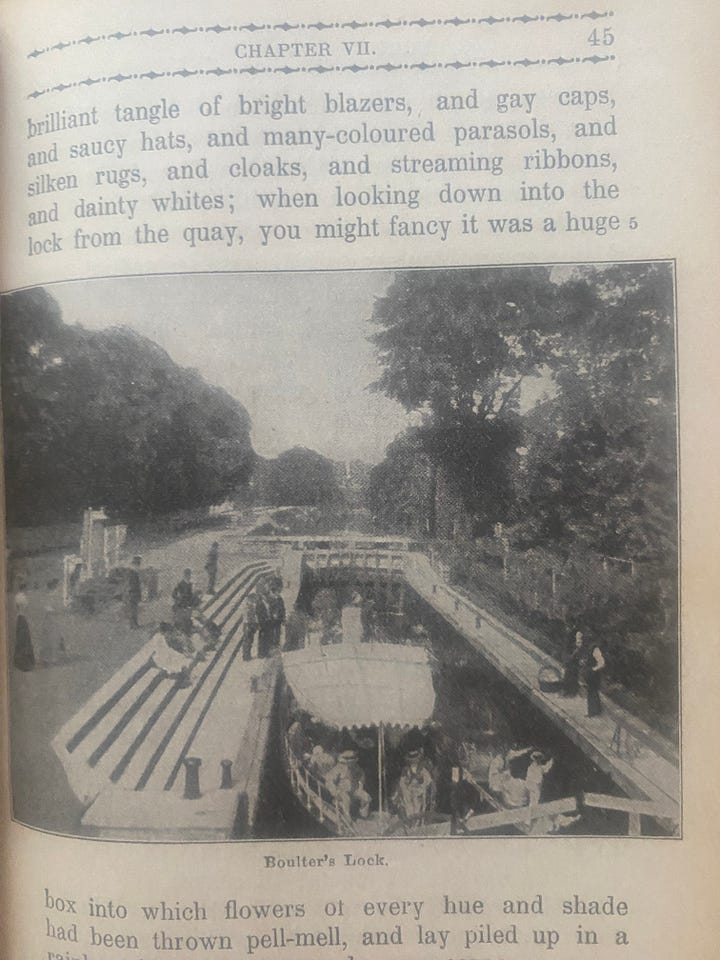
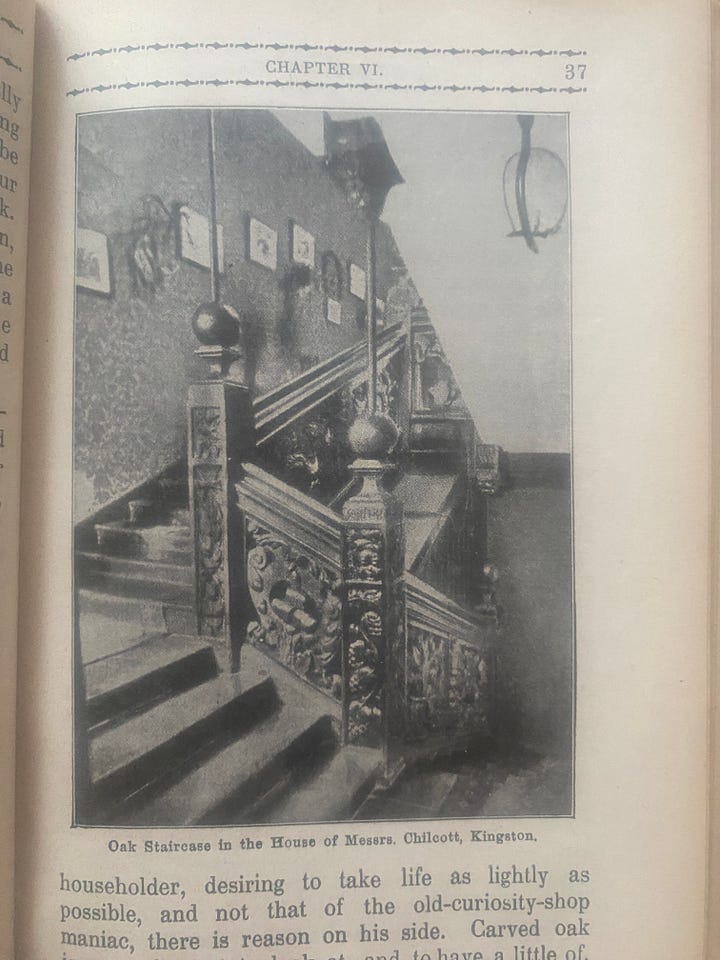
Jerome’s text also contains quite a few flowery descriptions of places like Hampton Court Palace and the old Saxon town of Dorchester that hark back to his original project. But it never takes long before Harris and George lumber in, bandying about choice insults (“you fat-headed chunk”). Or before Montmorency gets the scent of sausages and dashes onto the page. Jerome was unable to resist the comedy — and the result was one of the greatest failures in literary history. So to speak.
Another sample, just because the book is so eminently quotable, this time from the pages of my abridged edition:
Lovely. And how pleasant it is to imagine the misunderstandings these words might have caused the earnest school children who were forced to labour over them. How literally did they take them? Did they see the ironies? Did their teachers help explain the jokes? Were the jokes still funny after they had been explained?
It’s even more fun to imagine those readers who did manage to understand what was going on, who began to laugh along with J.’s narration, and who found themselves enjoying a comic masterpiece.
Touchingly, my edition has a few pencil notes that appear to have been made by a pupil:
I can’t actually decipher any of those marks, but no matter. I love the idea of someone in inter-war Germany trying to figure out not only what relation mustard should have to roast beef, but also why its absence made existence seem hollow — and why that, in turn, is so funny.
This, of course, is an example of the famous British sense of humour. The one that we like to think served us so well when facing up to the horrors of the Second World War.
And now I have more troubling thoughts about the readers of this edition from 1927.
How many of them found themselves fighting men like George and Harris? How many of the book’s readers committed crimes? How many didn’t? How many resisted? How many died?
It’s also worth dwelling on the fact that by the time those children were reading this version of the book, the safe world that Jerome K Jerome evoked so beautifully in Three Men In A Boat had already been mashed into the mud of the Somme.
He’d also written a follow-up called Three Men On A Bummel in which J. George and Harris travel through the Black Forest in Germany on bikes, and which even more poignantly describes a world that would soon be lost…
… Except, of course, it wasn’t. Not entirely. Because the books remain; speaking still about the possibilities of friendship and shared understanding, as well as the importance comfortable bicycle seats, functioning tin-openers and all the other things that Jerome K Jerome revealed to be such ripe subjects for comedy.
In fact, I want stop writing now, because I’m eager to start reading those marvellous books again. Some jokes endure. Maybe they get even better with time.
Fondly,
Sam
Other business
Lori Feathers and I spoke to Laurent Binet on Across The Pond. He was delightful. I’m also very happy to recommend his recent book Perspectives. It’s a blast. (The episode should be reaching all pod-catching services around the time that this piece is published.)
I’ve also put out a new Galley Beggar Press newsletter on our website. It’s got news about our next release so please look that up. It’s an important book.
Before I was (happily) distracted by Jerome K Jerome, I was intending to write something about publishers’ growing dependence on BookTok. Will try to have a go soon.
Jude Cook has set up a new press called Conduit that will focus on male authors. Not sure what I think at this stage - but he gives some thoughtful quotes in The Bookseller. I wish him luck - but don’t envy him reading through the kinds of submissions he might be about to receive.
Holme-next-the-Sea is very lovely. I forgot to take photos because I was enjoying walking around so much. But here I am with my own dog friend on a beach nearby:
Horst was writing in 1902 according to the date on the introduction. So just over a decade after Three Men In A Boat was first published in England in 1889.
By the way, I should come clean: I don’t speak German. I’m getting this translation from my phone. Sorry if it’s bunk.

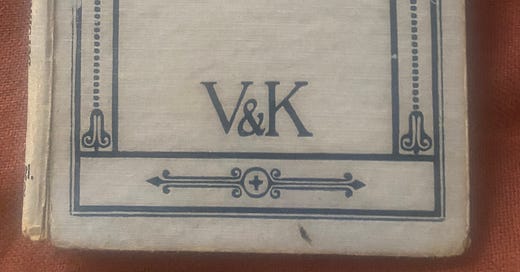



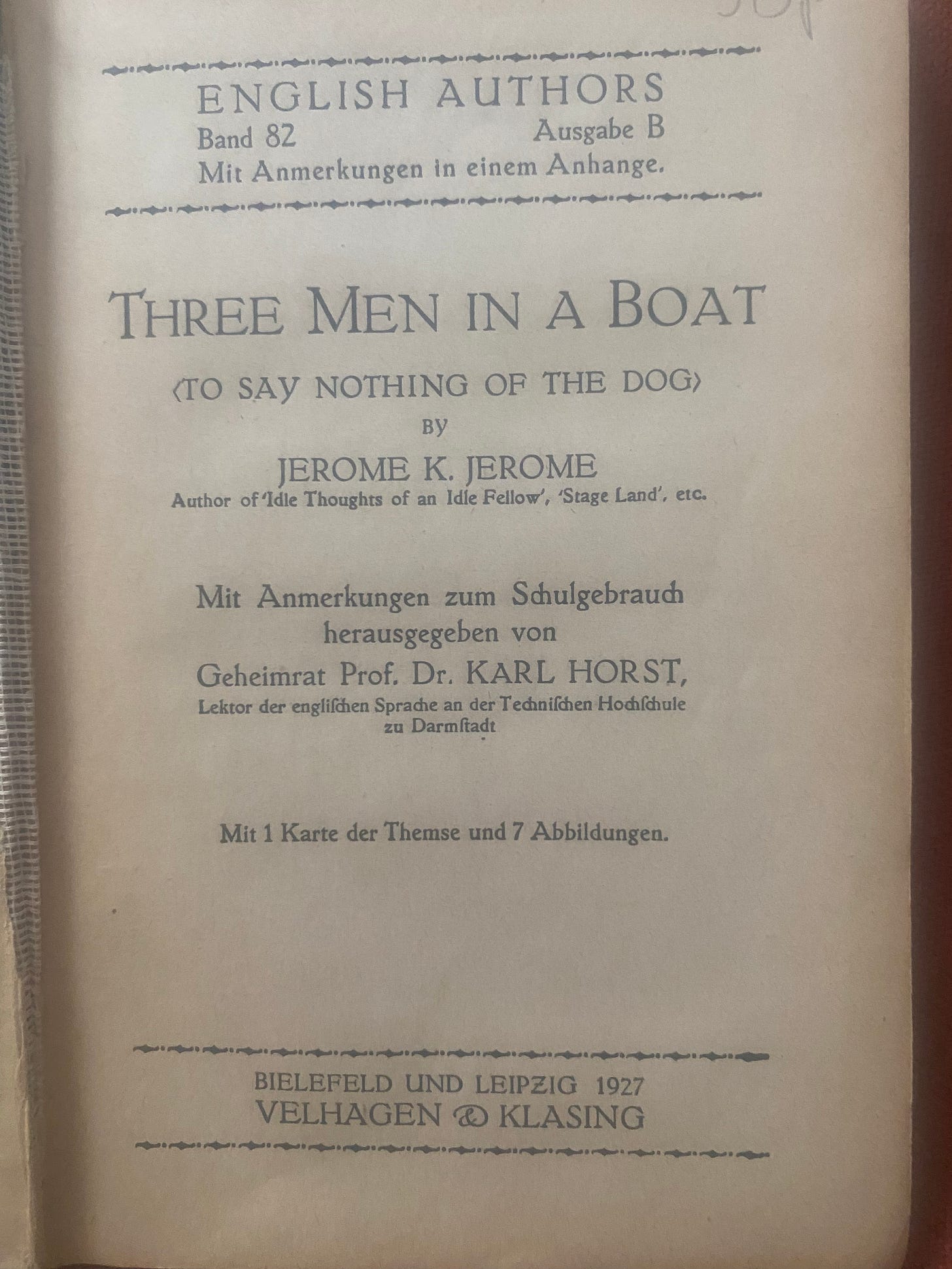

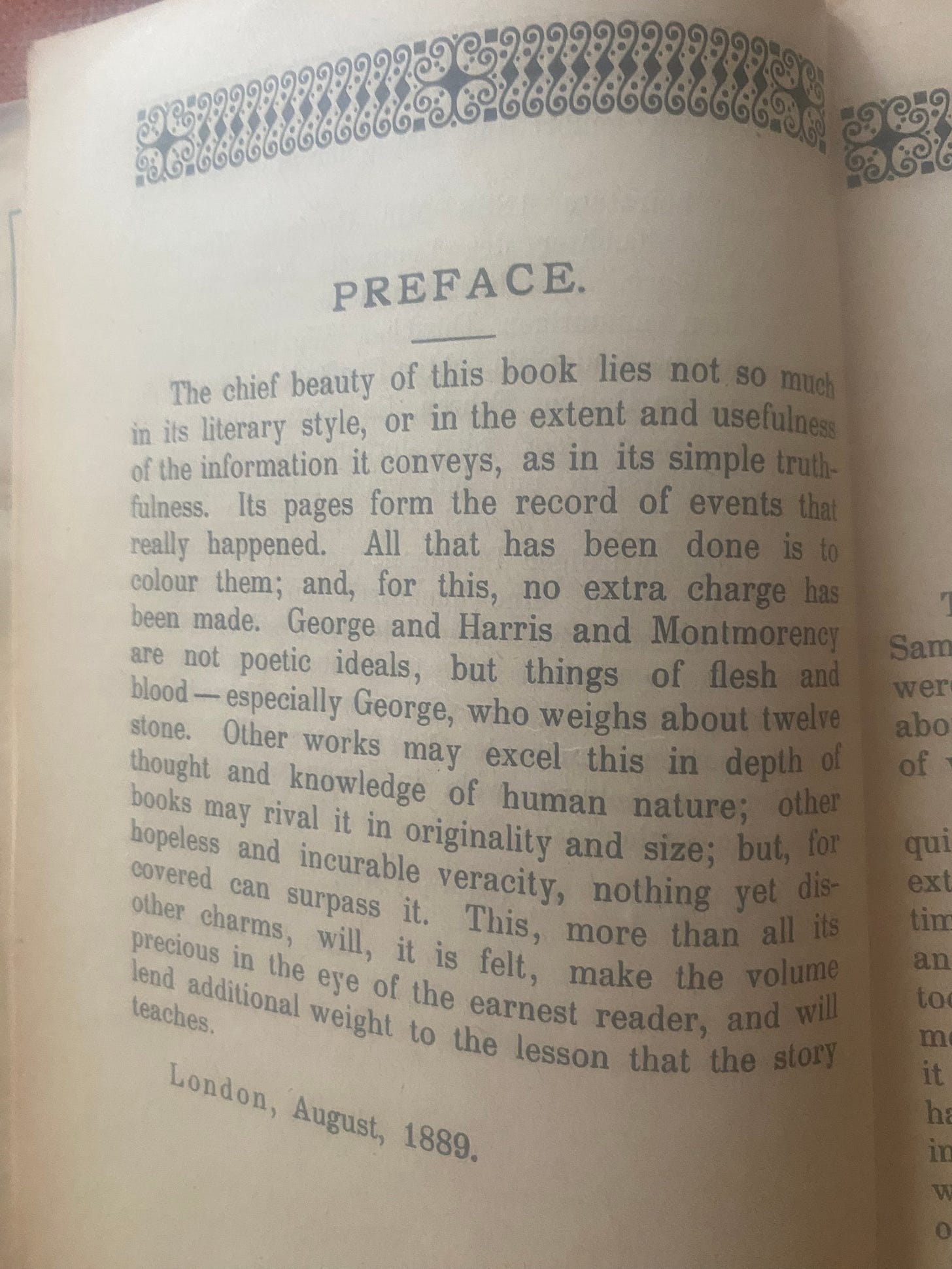
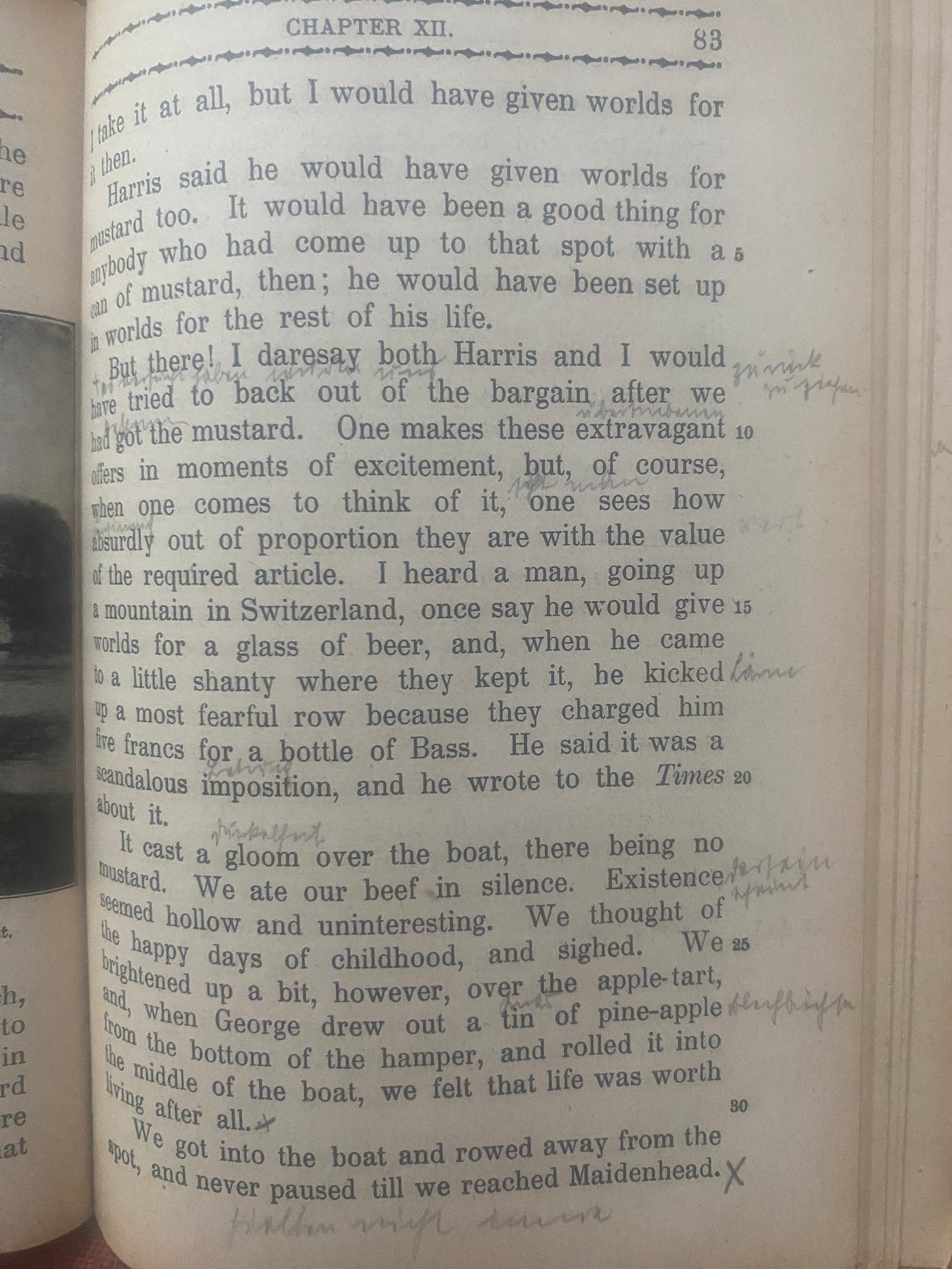

Just been alerted to the existence of this film: https://www.youtube.com/watch?v=_46MGGVlIms - Had to tear myself away after 5 minutes to get some work done - but it looks wonderful.
Thanks to the once-great Powell's Books in Portland Oregon I discovered Jerome's Three Men in a Boat. They displayed it along side a newer book by Connie Willis called To Say Nothing of the Dog. I was advised by the very knowledgeable store clerk to read Jerome first. I read it on the plane back to the east coast and kept laughing out loud when everyone else was sleeping. Fortunately my seatmate turned out to be British and the two of us set up rather a din enjoying the book together. Connie Willis' To Say Nothing of the Dog I started when I got home and it's a marvel: a fitting time-traveling parallel journey on the Thames with a time-lagged time traveler and, of course, a dog who was probably too much a sweetheart to tackle Montmorency.